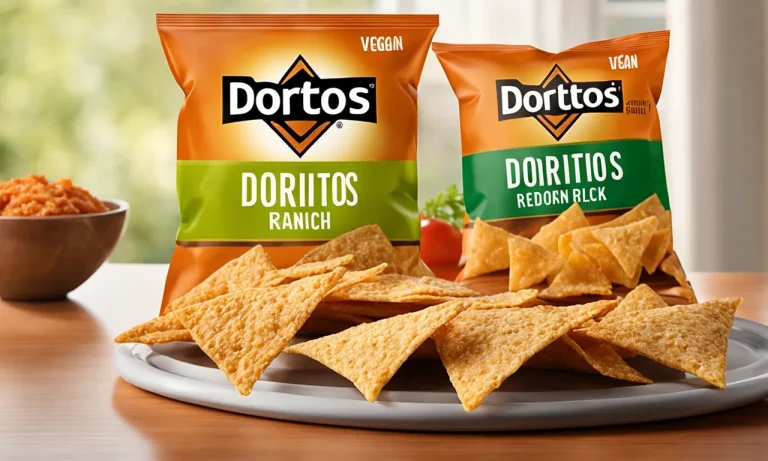Is Domino Sugar Vegan? Examining This Common Pantry Staple
With its familiar blue packaging, Domino is one of the most popular sugar brands on grocery store shelves. But can vegans enjoy Domino sugar guilt-free? If you’re short on time, here’s a quick answer to your question: Yes, Domino sugar is considered vegan, as it contains no animal-derived ingredients.
In this comprehensive article, we’ll take a close look at Domino sugar – its ingredients, production process, and filtration practices – to determine its suitability for a vegan diet. We’ll also provide some alternatives to standard cane sugar that can fit into a strict plant-based lifestyle.
Domino Sugar’s Ingredients
When it comes to determining whether Domino Sugar is vegan, it’s important to take a closer look at its ingredients. While sugar itself is derived from plants, the refining process can sometimes involve animal products. Let’s break it down:
1. Cane Sugar
Domino Sugar is made from cane sugar, which is extracted from the sugarcane plant. This type of sugar is considered vegan as it is derived from a plant source.
2. Bone Char
One concern regarding the vegan status of Domino Sugar is the use of bone char in the refining process. Bone char is a granular material made from animal bones and is used as a decolorizing filter to remove impurities from sugar.
However, it’s important to note that not all sugar refineries use bone char, and some manufacturers have opted for alternative methods.
Domino Sugar, in particular, does not use bone char in the refining process. They utilize a different method called carbonation which involves using activated carbon to filter and purify the sugar. This means that Domino Sugar can be considered vegan-friendly.
3. Non-GMO
Another aspect to consider when evaluating the vegan status of Domino Sugar is its non-GMO (genetically modified organism) status. Genetically modified sugar beets are commonly used in the production of sugar.
However, Domino Sugar sources its cane sugar from sugarcane, which is not genetically modified. This is good news for those looking for a vegan sugar option that is also non-GMO.
How Domino Sugar Is Produced and Processed
From Cane to Crystal
Domino Sugar is produced from sugar cane, a tall perennial grass that grows in tropical and subtropical regions. The sugar cane stalks are harvested and taken to the sugar mill, where they undergo a series of processes to extract the sugar.
First, the stalks are crushed to extract the juice, which is then filtered to remove any impurities. The juice is then heated to evaporate the water content, leaving behind a thick syrup called molasses.
The molasses undergoes further processing to remove more impurities until it becomes a thick, dark brown syrup known as raw sugar.
At this stage, the raw sugar contains various impurities, such as plant fibers, minerals, and other non-sugar components. To transform it into the familiar white crystals we know as granulated sugar, the raw sugar undergoes additional refining processes.
Filtration and Refining Practices
One of the key steps in the refining process is filtration. The raw sugar syrup is passed through a series of filters to remove the remaining impurities. These filters are typically made of activated carbon, which helps to absorb and trap any remaining non-sugar substances.
This filtration process helps to improve the clarity and purity of the sugar.
After filtration, the sugar syrup undergoes a process called crystallization. The syrup is heated and cooled under controlled conditions, causing the sugar molecules to form crystals. These crystals are then separated from the remaining syrup through a centrifuge, which spins the sugar crystals and separates them from the liquid.
The separated sugar crystals are then dried and further processed to achieve the desired granulation size. Some brands, including Domino Sugar, also add a small amount of cornstarch to their products as an anti-caking agent, which helps to prevent the sugar from clumping together.
It’s important to note that the refining process used by Domino Sugar and other major sugar manufacturers is a highly controlled and regulated process. Stringent quality control measures are in place to ensure that the final product meets the required standards for purity and safety.
For more information on the production and processing of Domino Sugar, you can visit their official website: www.dominosugar.com.
Potential for Animal Ingredient Contamination
During Production
When it comes to determining whether Domino Sugar is vegan, one potential concern is the possibility of animal ingredient contamination during the production process. While sugar itself is derived from plants, the refining process may involve the use of certain animal-derived substances.
For instance, bone char, which is obtained from animal bones, is sometimes used in the decolorization process of sugar refining. This raises questions about the vegan status of Domino Sugar.
It’s important to note that not all sugar companies use bone char in their refining process. Some companies, including Domino Sugar, have chosen alternative methods to decolorize their sugar, such as using activated carbon or ion-exchange resins.
These methods are considered vegan-friendly as they do not involve animal-derived substances. So, if you’re specifically looking for a vegan sugar option, it’s recommended to choose sugar brands that explicitly state their use of animal-free refining methods.
Through Packaging and Transportation
Another potential source of animal ingredient contamination is through the packaging and transportation of the sugar. While the sugar itself may be vegan, there is a possibility of cross-contamination during these stages.
For example, if the sugar is packaged in facilities that also handle non-vegan products, there is a risk of trace amounts of animal-derived ingredients finding their way into the sugar.
To minimize this risk, some sugar brands have implemented strict protocols and certifications to ensure their products remain vegan. These certifications, such as Vegan Action’s Certified Vegan or the Certified Vegan by Vegan Society, provide consumers with confidence that the sugar has been produced and handled in a manner that avoids any animal ingredient contamination.
It’s important for individuals following a vegan lifestyle to make informed choices when it comes to the products they consume. Checking for certifications, reading labels, and researching the production methods of sugar brands can help ensure that the sugar you choose aligns with your vegan values.
For more information on vegan sugar options and certifications, you can visit vegan websites such as vegan.org or vegansociety.com.
Alternatives to Standard Cane Sugar
While standard cane sugar is a common pantry staple, many people are looking for alternatives due to dietary restrictions or personal preferences. Fortunately, there are several options available that can be used as substitutes in various recipes.
Two popular alternatives to standard cane sugar are unrefined cane sugars and alternative sweeteners.
Unrefined Cane Sugars
Unrefined cane sugars, such as Muscovado sugar and Demerara sugar, are minimally processed and retain more of their natural molasses content. This gives them a richer flavor and a deeper color compared to standard white sugar.
Muscovado sugar, for example, has a slightly caramel-like taste that adds depth to baked goods and desserts. Demerara sugar, on the other hand, has a crunchy texture that works well as a topping for cookies and crumbles.
These unrefined cane sugars are often considered to be more natural and less processed than standard cane sugar. They are also higher in minerals like calcium, iron, and potassium. While they can be used as a 1:1 substitute for standard cane sugar in most recipes, it’s important to note that they may affect the texture and appearance of baked goods due to their higher moisture content.
Alternative Sweeteners
For those looking to reduce their sugar intake or avoid cane sugar altogether, alternative sweeteners offer a range of options. Stevia, for example, is a natural sweetener derived from the Stevia rebaudiana plant.
It is significantly sweeter than cane sugar, so only a small amount is needed to achieve the desired sweetness. Stevia is also calorie-free, making it a popular choice for those watching their weight or managing diabetes.
Another alternative sweetener is coconut sugar, which is made from the sap of coconut palm trees. It has a lower glycemic index compared to standard cane sugar, meaning it has a lesser impact on blood sugar levels.
Coconut sugar also has a caramel-like flavor that works well in baking and can be substituted in a 1:1 ratio for cane sugar.
Other alternative sweeteners include agave nectar, maple syrup, and honey. These options offer their own unique flavors and can be used as substitutes in a variety of recipes. However, it’s important to keep in mind that these sweeteners still contain sugar and should be used in moderation.
Whether you’re looking for a more natural option or need to accommodate dietary restrictions, there are plenty of alternatives to standard cane sugar. Experimenting with different sweeteners can open up a whole new world of flavors and possibilities in your cooking and baking.
Are Other Domino Food Products Vegan?
While the focus of this article is on whether Domino Sugar is vegan, it’s worth exploring whether other products in the Domino food line are also suitable for those following a vegan lifestyle. Thankfully, Domino offers a variety of products that are vegan-friendly, allowing individuals to enjoy their favorite sweet treats without compromising their dietary choices.
Domino Confectioners Sugar
Domino’s Confectioners Sugar is a vegan option for those who love to bake and decorate their desserts. Made from pure cane sugar, this powdered sugar doesn’t contain any animal-derived ingredients, making it a suitable choice for vegans.
Domino Light Brown Sugar
Domino’s Light Brown Sugar is another vegan-friendly option. It is made from pure cane sugar and does not contain any animal products. This sweet and slightly molasses-flavored sugar can be used in a variety of recipes, from cookies to BBQ sauces.
Domino Dark Brown Sugar
Similar to the Light Brown Sugar, Domino’s Dark Brown Sugar is also vegan. It is made from cane sugar and molasses, giving it a rich and deep flavor. This sugar is perfect for adding a touch of sweetness to your favorite baked goods or homemade caramel sauces.
Domino Granulated Sugar
Good news for vegans – Domino’s Granulated Sugar is vegan-friendly as well. It is made from pure cane sugar and does not contain any animal ingredients. This versatile sugar can be used in a wide range of recipes, from beverages to baked goods.
It’s important to note that while the aforementioned Domino products are vegan, it’s always a good idea to double-check the ingredients list on any food product before purchasing, as formulations can sometimes change.
Additionally, some specialty products like flavored sugars or sugar blends may contain non-vegan ingredients, so it’s essential to read the labels or check with the manufacturer if you have any concerns.
For more information on Domino’s vegan-friendly products, you can visit their official website at www.dominosugar.com. Their website provides detailed information about their various sugar products and can serve as a helpful resource for vegans and individuals with specific dietary needs.
Conclusion
Plain Domino sugar contains no animal-derived ingredients, making it vegan-friendly. However, vegans should be aware of potential contamination risks and also consider less refined sugar alternatives that align with a strict plant-based diet.







